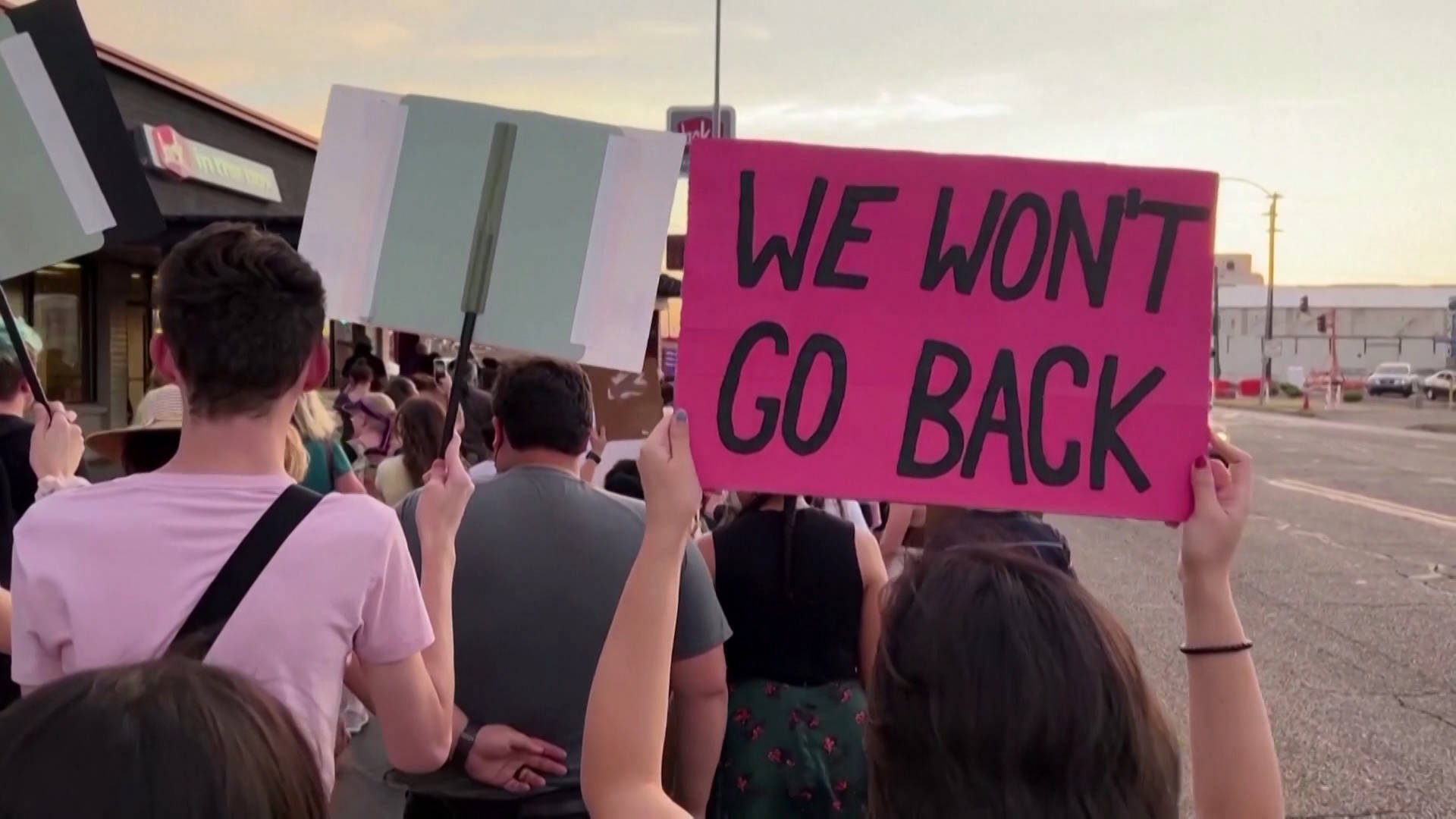This is a rush transcript. Copy may not be in its final form.
AMY GOODMAN: In an historic ruling, Arizona’s conservative Supreme Court has reinstated an 1864 law barring almost all abortions in the state. In its ruling, the court wrote, quote, “Physicians are now on notice that all abortions, except those necessary to save a woman’s life, are illegal,” unquote. The 160-year-old law predates Arizona becoming a state and was passed before women could even vote.
While the court has stayed its decision for 14 days, the ruling sent shockwaves across Arizona and the nation. President Biden slammed the ruling as “extreme and dangerous.” Arizona’s Attorney General Kris Mayes said she will not enforce it, saying, quote, “No woman or doctor will be prosecuted under this draconian law.” Arizona’s Democratic Governor Katie Hobbs vowed to protect abortion rights.
GOV. KATIE HOBBS: Arizona’s 2022 abortion ban is extreme and hurts women, and the near-total Civil War-era ban that continues to hang over our heads only serves to create more chaos for women and doctors in our state. As governor, I promise I will do everything in my power to protect our reproductive freedoms.
AMY GOODMAN: Last week, the group Arizona for Abortion Access said it had collected enough signatures — over half a million — to put a measure on the November ballot to enshrine abortion rights in Arizona. Reproductive rights will also play a key role in Arizona’s closely watched Senate race. Republican candidate Kari Lake criticized the court’s ruling Tuesday even though just two years ago she called it, quote, a “great law.” The Arizona ruling came just a day after Republican presidential front-runner Donald Trump said abortion should be decided by the states.
For more, we’re joined by Amy Littlefield, abortion access correspondent at The Nation magazine.
Amy, welcome back to Democracy Now! Can you talk about the significance of this ruling in Arizona?
AMY LITTLEFIELD: Good morning, Amy. And I just want to deeply apologize. I didn’t have time to put on my whalebone corset and my hoop skirt this morning before appearing on television. I know there might be men watching. I hope the anti-vice squad doesn’t come after me for disseminating information about abortion, which is what I’m about to do here.
In all seriousness, though, I think what’s become abundantly clear, both at the federal level and at the state level now in Arizona, is that the central strategy of the anti-abortion movement is to roll back the clock to the Victorian era, because they know that they cannot win through the democratic process, because abortion rights are popular. They always have been popular, but now the abortion rights majority in this country is mobilized and angry. And they know they can’t win at the ballot box, and so they are combing through zombie laws from the 19th century to see if they can restrict abortion that way, which is not only anti-abortion, but deeply anti-democratic, as well.
So, this is a law that is coming back into force in Arizona that dates back to a time before women could vote, that dates back to a time before slavery was ended, when Black women in large swaths of the country were still considered chattel. This dates back to an era where we had widespread regulation not just of abortion, but of anything that was considered vice or, you know, immoral. It dates back to an era where we had the federal Comstock Act, right? In 1873, the federal Comstock Act, which was used to restrict abortion drugs and devices through the mail, this law, you know, from 1873, which hasn’t been enforced in many, many years, is now the central strategy of the anti-abortion movement. At the federal level, they’re trying to bring it back into force to create a nationwide anti-abortion ban, because, of course, again, they can’t win in the court of public opinion.
And we’re seeing this also in Florida, another state that recently had a really important abortion ruling that could lead to the instatement May 1st of a six-week ban in that state, where justices on the conservative Supreme Court in that state seem to be flirting with the idea that personhood for fetuses and embryos is protected under the Florida Constitution. The key caveat here, of course, is that we’re going to see abortion on the ballot in Arizona and Florida, and so the people are going to have their say.
I want to just make one more important point, Amy, which is abortion is still — this ruling is not in effect in Arizona. The Florida ruling is also not in effect yet, which means that Florida, abortion is still legal up to 15 weeks. Arizona, abortion clinics, as far as I know, as of this moment, are still providing services. And so, you can go to INeedAnA.com or PlanCPills.org to find up-to-date information about access to abortion regardless of where you live.
JUAN GONZÁLEZ: And, Amy, what do you make of the statements, the public statements, of the attorney general in Arizona, Kris Mayes, and of the governor in direct opposition to the court’s decision? What do you think is going to be the impact? As you were mentioning, there will be — there will likely be a ballot question now in Arizona on abortion. What do you think will be the impact on turnout and the central question of abortion in this upcoming election?
AMY LITTLEFIELD: Absolutely. I mean, Arizona activists were already working on a ballot initiative to protect the right to abortion in that state. Florida activists have also cleared hurdles to put the question of abortion rights on the ballot in that state. We’re going to see it on the ballot in other states, too, where the stakes aren’t quite as high. And, you know, this could — I think this could swing the election, right? I mean, there’s no question. The Biden administration, the Biden campaign started paying attention to Florida, started buying ads in Florida, right after the court decision reviving the six-week ban there. You know, Arizona was already considered a battleground state. So there’s no question the Democrats are banking on this being a huge way to lift their boats in the next election.
I mean, the key caveat there is, look, if Democrats want to win on the issue of abortion, I think they’re going to have to start listening to reproductive justice activists, who are saying, number one, what’s going on in Gaza right now is a reproductive justice issue, and if you are going to be an administration that claims to support reproductive rights and justice, you cannot support what’s going on in the Israeli bombardment of Gaza right now.
And, number two, they need to repeal the Comstock Act. Again, we could see a replication of what’s happening in Arizona at the federal level. This is not a pro-life movement. This is a pro-zombie movement. And they are trying to bring back these zombie laws from the 19th century. And if it can happen in Arizona, it can happen at the federal level if the Comstock Act comes back into force. And we saw recently in arguments before the Supreme Court that at least two justices on the Supreme Court seemed very eager to bring the Comstock Act back into effect and roll this entire country back to the Victorian era.
AMY GOODMAN: Do you take some — do you feel hopeful when you see the response of Republicans in Arizona? I mean, you have Kari Lake, who hailed this law two years ago, now saying it was a bad decision. You have former Governor Ducey, who appointed five of the seven state Supreme Court justices who made this decision to go back 150 years, saying it wasn’t a good decision. Kari Lake, of course, going up against Ruben Gallego for the Senate race. He is already raising this as a major issue.
AMY LITTLEFIELD: Yes, Amy, I feel nothing short of sheer delight when I see Republicans running from this issue in that way. I mean, they understand the writing is on the wall. Abortion was popular before the Dobbs decision, right? A majority, overwhelming majority, of the population wants abortion to be legal in all circumstances. That was true — it’s been true for many years. After Dobbs, that population is angry. They are motivated. They are voting. They are organizing. And Republicans and Democrats alike understand this. So I’m not surprised to see Republicans running from this issue, backtracking on their own anti-abortion statements, trying to hide from anyone who wants to ask them questions about that.
Again, I think this is — the sleeping giant of the pro-abortion rights majority in this country has been awakened. We saw that in Kansas right after the Dobbs decision — right? — where this ruby red state voted to protect abortion rights in the state. And so, I think, you know, that’s, again, a reason for Democrats to be very encouraged or Republicans to be very discouraged, in states like Arizona and Florida, where abortion is likely going to be directly on the ballot. But, again, Democrats can’t just coast to victory on that, right? If they’re going to purport to be the candidate that represents the reproductive health rights and justice movement, they’ve got to start listening to that movement’s demands.
AMY GOODMAN: Interestingly, Vice President Kamala Harris is headed to Tucson on Friday to give a speech on this issue. Amy Littlefield, I want to thank you for being with us, abortion access correspondent at The Nation magazine.
When we come back, Israeli airstrikes continue in Gaza on the first day of Eid, and there’s been little increase in humanitarian aid being allowed in. We’ll be joined by Middle East analyst Mouin Rabbani. Stay with us.











Post comments (0)